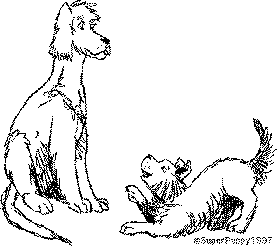

by Peter & Nancy Vollmer
Getting a new puppy is one of the most exciting times in every dog lover's life. Whether your dogs work for you or occupy comfortable positions on your couch, the acquisition of a new canine companion is surrounded by hopes, dreams, expectations, and the bustle of preparing the household for a new member.
What if you already have one or more dogs? Can you insure that the newcomer will be accepted into the "pack" with a minimum of stress? What can be done to guarantee that this little fellow's first impression of his new home won't be filled with bared teeth and hostile growls? And how can you help your resident dog(s) relax and adapt to the changes that will inevitably occur in the established routines?
The best defense against the unknown is often a good offense, and in dogs that means preparation, preparation, and more preparation.
You can begin long before the actual arrival date. Since most well-socialized adult dogs have built-in inhibitions against harming very young pups, it's a good idea to have the resident meet the puppy while it is still quite young, away from both dogs' home territories.
If possible, a week or so before the pup comes home, take your older dog to visit the newcomer. To prevent jealousy, when the two first greet, the puppy can be held by the breeder. Before you bring the puppy home, have them meet again at a park or other neutral location. If you have more than one dog, do this with each one separately.
Meanwhile, rehearse you leadership with the resident(s). Make sure that he takes food from you ONLY when you say "okay." (See SuperPuppy, page 18 and How To Play With Your Dog, "Notes for Parents.") Insist he ALWAYS stop whatever he's doing when you raise your voice. Spend some time going over the DROP and WAIT commands in case his obedience skills are rusty.
Keep your routines as consistent as possible. The new puppy will take a lot of your time, but don't neglect the "old" dog's training and play times. Make an effort to spend extra fun times with him when the puppy is safely snoozing in its den. He should continue to get special privileges such as rides in the car or trips to the park by himself. Make sure that he's getting plenty of exercise and that his diet is adequate to help combat any stress caused by the new arrival.
Before you actually carry the pup over the threshold, have his own personal space prepared - a crate and exercise pen - where he can escape and relax from the pressures of having to adapt to a new lifestyle and family.
Don't expect him to embrace your routines immediately, especially if he's an older puppy. Give him a place to eat in peace, and a place where he can enjoy his toys safely. You can avoid many squabbles over food and possessions if you don't put a newcomer in the position of having to defend himself right off the bat.
Finally, don't be overly protective. Preventing adult dogs from properly subordinating a juvenile can lead to problems down the road. When adolescence hits, an unsubordinated youngster may try to take out the competition and serious fights can result.
Older dogs should never be allow to harass or terrorize a pup and vice versa! Use your leadership to enforce the rules, and chances are good that your pack will be a harmonious one.
|
SuperPuppy®
Press : PO Box 463030 : Escondido, CA : 92046-3030 : 1-760-489-1818 : Home Page: www.superpuppy.com |
© Peter J. Vollmer 1997-2019
© Nancy B.
Vollmer 1997-2019
© SuperPuppy® 1997-2019